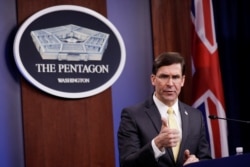The U.S. Army is helping to develop a vaccine for the deadly coronavirus, but doctors are at least 12 to 18 months away from getting it to the public.
Doctors from Fort Detrick and the Walter Reed Army Institute of Research told reporters Thursday at the Pentagon that teams had identified a potential vaccine that was “mutually supportive” but not duplicative to potential vaccines being worked on by the National Institutes of Health (NIH).
The vaccine candidate targets what Dr. Kayvon Modjarrad, director of emerging infectious diseases at Walter Reed, called the “spoke” or “spike protein” that helps the virus attach and enter human cells.
He said the Army was now testing the vaccine candidate on mice. After that, the potential vaccine will be tested on larger animals and then humans to determine whether it is safe.
If the vaccine candidate successfully makes it through that testing, Modjarrad said, it could enter a second phase of human testing by next winter, where doctors will evaluate the vaccine’s effectiveness at stopping the coronavirus.
“The earliest, earliest, earliest [is] probably 12 to 18 months to get something out to the population,” Modjarrad said.
In addition to vaccine work, the Army is growing the coronavirus from a sample taken from a patient in Washington state in order to test potential vaccines, according to Colonel Wendy Sammons-Jackson, director of the Army Medical Research and Development Command’s military infectious diseases research program.
Pentagon preparing for coronavirus infiltration
Secretary of Defense Mark Esper said Thursday that the Pentagon was planning for a potential outbreak should the coronavirus infiltrate the massive U.S. military headquarters.
Esper told reporters the Pentagon was in the "throes of finalizing a plan" to be presented to him next week on how to respond should someone who works in the building test positive for COVID-19.
He added that he felt confident the Pentagon would be able to continue performing necessary functions during any outbreak.
“Our National Military Command Center has the capability to go for weeks at a time if they have to be locked down inside the building if we have some type of outbreak,” Esper said.
The defense secretary said he spent 90 minutes Thursday morning discussing coronavirus precautions with military leaders. He said the Pentagon could start "simple things" now like wiping down doorknobs and limiting physical contact to help prevent the virus’ spread, adding that the Defense Department might also need to look at upcoming travel.
About 22,000 people work at the military headquarters, often called the largest office building in the world.





